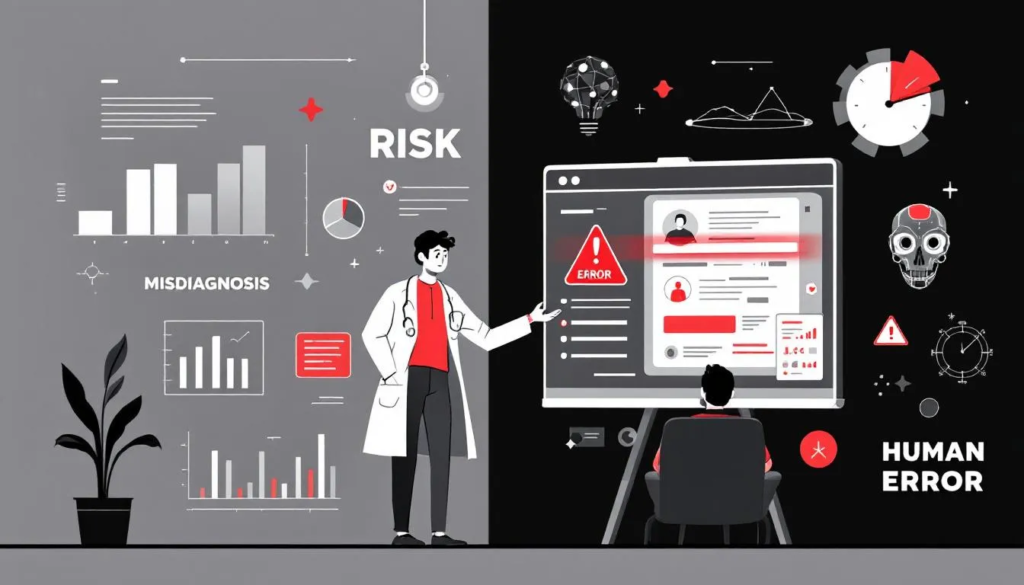AI has a growing role in healthcare, but understanding its pitfalls is crucial. Searching ‘disadvantages of AI in healthcare’ usually means looking for the main issues. Key concerns include losing the human touch, data privacy risks, misdiagnoses, high costs, ethical dilemmas, biases, data challenges, and overdependence on AI. This article will cover each disadvantage in detail.
Key Takeaways
– AI in healthcare may lead to a lack of human touch, diminishing empathy and trust in patient-provider relationships, which are essential for effective care.
– Data privacy issues surrounding AI applications pose significant risks, necessitating robust privacy protocols and ethical management of sensitive patient information.
– The risk of misdiagnosis and biases within AI algorithms highlight the need for careful implementation and continuous monitoring to ensure reliable and equitable patient care.
Lack of Human Touch in Patient Care

The essence of patient care lies in the personal connection between healthcare providers and patients. AI, despite its numerous advantages, often lacks the ability to convey empathy and compassion—qualities that are vital for effective patient-provider relationships. This shortfall can lead to a dehumanized experience for patients, who may feel that their emotional needs are not being addressed.
Patients frequently express a preference for human interaction, especially when discussing personal health concerns and mental health. The inability of AI to understand emotional nuances can lead to a lack of trust from patients. This trust is crucial for successful treatment outcomes, as a strong patient-provider relationship can significantly influence a patient’s willingness to adhere to medical advice and treatment plans.
Moreover, healthcare professionals may resist adopting AI systems due to fears that their expertise might be compromised. The integration of AI in clinical settings often raises concerns about the potential erosion of the human elements of care within the health care system. Medical practitioners worry that an over-reliance on AI could diminish their role and the quality of personalized healthcare they provide.
The clinical practice environment thrives on the human touch in a clinical setting. Whether it’s a comforting hand on a shoulder or a reassuring smile, these small gestures can make a significant difference in a patient’s experience. The impersonal nature of AI in healthcare systems can strip away these elements, leading to a more mechanical and less humane medical practice.
Future health professionals must be trained not only in the use of AI technologies but also in maintaining the human aspects of patient care. Balancing technological advancements with compassionate care will be key to ensuring that the healthcare system remains patient-centric. Prioritizing the human touch allows healthcare providers to harness AI’s benefits while preserving empathy and compassion in patient care.
Data Privacy Issues
The integration of AI in healthcare necessitates the processing of vast amounts of sensitive patient data, which intensifies concerns over data privacy. The handling of such data by AI systems amplifies the risk of privacy breaches, as these systems often analyze and store significant volumes of health data and big data. With the increasing reliance on electronic health records and data analytics, the potential for unauthorized access and data breaches becomes a critical issue, especially with solutions like IBM Watson Health.
Even de-identified patient data is not entirely safe from privacy threats. Techniques exist that can re-identify anonymized data, posing significant risks to patient confidentiality and raising safety concerns. This vulnerability is particularly concerning in cross-border data exchanges, where differing data-sharing regulations can exploit legal loopholes and heighten privacy risks.
The ethical concerns surrounding the management of health data cannot be overstated. Mismanagement of patient records can lead to compliance issues and undermine patient trust in the healthcare system. Strengthening patient privacy protocols is essential as AI systems become more integrated into healthcare settings.
Data privacy regulations, while necessary, can sometimes restrict access to essential health data availability, limiting the effectiveness of AI training and implementation. Balancing the need for robust data privacy measures with the requirements for effective AI development is a delicate task. Employing a federated model, which allows institutions to train AI without sharing sensitive information, can enhance data security and minimize privacy risks.
Addressing ethical challenges in data privacy involves not only implementing stringent data protection measures but also fostering a culture of transparency and trust. Healthcare providers and AI developers must work together to ensure that patient data is handled with the utmost care and respect. By prioritizing data privacy, the healthcare sector can maintain patient trust and confidentiality, which are fundamental to the successful implementation of AI technologies.
The importance of addressing data privacy issues in AI healthcare applications cannot be stressed enough. Ensuring that patient data remains secure and confidential is paramount to maintaining the integrity of the healthcare system and fostering trust among patients. As AI continues to evolve, so too must our approaches to safeguarding patient data and addressing the ethical concerns that come with it.
Risk of Misdiagnosis

AI systems have the potential to revolutionize diagnostics, but they also carry the risk of misinterpreting patient data, leading to misdiagnoses. In some cases, AI models may fail to provide more accurate diagnoses than experienced human practitioners, highlighting the limitations of these technologies. This risk is particularly concerning in complex medical cases, where the nuances of patient symptoms and medical history require careful consideration of ai powered systems.
Biases in AI algorithms can further exacerbate the risk of misdiagnosis. These biases often stem from non-representative training data, which can lead to inconsistent performance across different patient demographics. For example, an AI system trained predominantly on data from a specific demographic may not perform as well when diagnosing patients from other backgrounds, resulting in suboptimal patient outcomes.
The potential liability issues related to AI misdiagnosis are significant. If an AI system provides an incorrect diagnosis or treatment plan, healthcare providers could face legal challenges. This liability extends to both the developers of the AI technology and the medical practitioners who rely on these systems for patient care. The complexity of understanding AI outputs, especially in intricate diagnoses, adds another layer of risk.
Ensuring that AI systems are thoroughly tested and validated before deployment is crucial to minimizing the risk of misdiagnosis. This involves rigorous clinical trials and continuous monitoring of AI performance across various patient populations. This process helps healthcare providers identify and address biases and inaccuracies in AI algorithms, enhancing their overall reliability to train ai systems.
Incorporating AI technologies in health care ai should be approached with caution. While AI can enhance diagnostic capabilities, it is not infallible. Healthcare professionals must be trained to interpret AI-generated insights critically and integrate them with their clinical judgment. This balanced approach will help mitigate the risks associated with AI misdiagnosis and ensure that patient care remains at the forefront of medical practice.
The promise of precision medicine and improved patient outcomes through medical ai is tantalizing, but it comes with the responsibility of addressing the inherent risks. By acknowledging and addressing the potential for misdiagnosis, the healthcare sector can harness the benefits of AI while safeguarding patient health and wellbeing.
High Implementation Costs
Implementing AI solutions in healthcare is an expensive endeavor, often requiring significant upfront investments. The complexity of AI solutions, infrastructure decisions, and the need for regulatory compliance all contribute to the high costs associated with AI implementation. For instance, developing and training AI models can escalate costs significantly due to the need for specialized expertise and resources.
Healthcare organizations must consider the following additional expenses and efforts when implementing AI solutions:
– Training staff to efficiently utilize AI solutions
– Adapting workflows to integrate AI seamlessly into existing health systems
– Financial investment, including an upfront cost for building custom AI applications, which can range from $100,000 to over $500,000 depending on the complexity of the application
– Time and effort required for integration
The cost of implementing basic AI functionalities in healthcare can start around $40,000 but may exceed $100,000 for more complex solutions. These figures can be daunting for smaller healthcare facilities, which may struggle to afford such investments. This financial barrier can limit access to advanced AI technologies, potentially worsening disparities in healthcare quality.
Integrating AI with existing electronic health records (EHR) adds another layer of expense. Engineering costs for this integration can range from $7,800 to $10,400, further increasing the financial burden on healthcare organizations. These costs can be particularly challenging for smaller practices and rural healthcare providers, who may already operate on tight budgets.
Despite the high costs, the potential for significant cost savings in the long term should not be overlooked. AI and robotic process automation can streamline operations, reduce human error, and enhance patient outcomes, leading to overall cost reductions in the healthcare system. However, achieving these benefits requires careful planning and investment.
Addressing the high implementation costs of AI in healthcare involves exploring funding opportunities, partnerships, and scalable solutions that can benefit healthcare providers of all sizes. Innovative cost reduction and improved accessibility can ensure AI advantages reach a broader range of facilities, enhancing the quality of care for all patients. To effectively implement ai solutions, it is crucial to consider these factors.
Ethical Dilemmas

The integration of AI in healthcare raises significant ethical and legal challenges that must be addressed. One of the primary ethical concerns is the process of informed consent. Patients must be fully aware of how their data will be used and the role of AI in their treatment plans. Ensuring transparency in AI applications is crucial to maintaining patient trust and autonomy.
The four principles of medical ethics—autonomy, beneficence, nonmaleficence, and justice—provide a framework for addressing ethical challenges in AI integration:
– Autonomy emphasizes the patient’s right to make informed decisions about their care.
– Beneficence and nonmaleficence focus on maximizing benefits while minimizing harm.
– Justice ensures that AI technologies are applied fairly, without discrimination.
AI ethics also involve addressing potential biases in AI algorithms and ensuring that AI decisions are transparent and explainable. Healthcare providers must be equipped to understand and question AI outputs, ensuring that they align with ethical standards and patient welfare. This requires robust governance frameworks and continuous monitoring of AI systems.
Addressing ethical challenges in AI healthcare applications is not a one-time task but an ongoing process. It involves regular audits, stakeholder engagement, and updates to ethical guidelines as AI technologies evolve. Prioritizing ethical considerations allows the healthcare sector to leverage AI’s benefits while safeguarding patient rights and ensuring equitable treatment.
Bias in AI Algorithms
Bias in AI algorithms is a significant concern in healthcare. AI systems trained on non-representative data can perpetuate existing biases, leading to discriminatory outcomes. These biases can result from poor design, unbalanced training data, or a lack of comprehensive datasets. The consequences of biased AI algorithms are far-reaching, potentially worsening societal inequalities and impacting patient outcomes negatively.
AI technologies must be designed and implemented with a keen awareness of these biases. Strategies to help mitigate bias in AI systems include:
– Open science practices, which involve transparency in AI development, allowing for peer review and collaboration to improve algorithm fairness and accuracy.
– Regular auditing.
– A society-in-the-loop approach.
Regular auditing of AI systems is essential to identify and address biases that may arise over time. This involves continuous monitoring and updating of AI algorithms to ensure ai systems remain fair and effective. A society-in-the-loop approach engages diverse stakeholders in the AI development process, ensuring that the voices of underrepresented groups are heard and considered.
Addressing bias in AI algorithms is critical to building trust in AI technologies and ensuring that they enhance rather than hinder healthcare delivery. Implementing robust strategies to mitigate bias helps develop AI systems that are more equitable and beneficial for all patients.
Challenges with Data Collection and Quality
Effective AI implementation in healthcare relies on high-quality data. However, data fragmentation and lack of standardization in electronic health records and electronic medical records complicate this process. Inconsistent data formats and incomplete patient records can hinder AI’s ability to provide accurate and reliable insights.
Historical biases in healthcare data can be perpetuated by AI algorithms, leading to discriminatory healthcare practices. For example, if an AI system is trained on data that reflects past inequalities, it may continue to produce biased outcomes. Addressing these historical biases requires careful curation and preprocessing of training data.
Collaborative efforts among healthcare institutions can:
– Enhance data sharing
– Improve AI model training by pooling resources and data to create more comprehensive and representative datasets
– Lead to better AI performance
– Help standardize data formats
– Improve data quality across the health sector
A suitable and accurate dataset with ground truth is essential to solving clinical questions with AI. Ground truth data provides a benchmark for training and evaluating AI models, ensuring that they produce reliable and valid results. Prioritizing data quality and collaboration can help the healthcare sector overcome data collection challenges and enhance AI technologies’ effectiveness.
Overreliance on AI Systems

Excessive reliance on AI tools in clinical practice can diminish the role of human judgment. While AI systems can provide valuable insights, they are not infallible. Overreliance on AI-generated medical knowledge can lead to misdiagnosis and adverse outcomes, particularly among non-experts who may lack the experience to question AI outputs.
Participants in studies have shown a tendency to follow artificial intelligence-generated advice, even when identified as low-accuracy, leading to potential health risks. This overreliance can undermine critical thinking and decision-making skills among healthcare professionals. Maintaining a balance between AI research assistance and human judgment is crucial to ensuring safe and effective patient care.
Concerns about overreliance on AI include the potential erosion of human judgment in clinical settings. Healthcare professionals must be trained to interpret AI insights critically and integrate them with their clinical expertise. This balanced approach will help maintain the quality of patient care and ensure that AI technologies are used responsibly.
Ensuring AI systems augment rather than replace human judgment allows the healthcare sector to leverage AI benefits while preserving the essential role of healthcare professionals. Continuous medical education and training ai systems on AI technologies are essential to achieving this balance and maintaining high standards of patient care.
Addressing AI Disadvantages

Addressing the disadvantages of AI in healthcare requires a multi-faceted approach. Techniques like federated learning offer several advantages:
– Allow AI model training without transferring sensitive patient data, thus enhancing privacy.
– Keep data decentralized, minimizing the risk of data breaches and unauthorized access.
– Provide a more secure framework for AI development.
Differential privacy is another technique that introduces randomness to datasets, helping to protect individual identities in health data. This method ensures that AI algorithms can learn from data analysis without compromising patient privacy, thus maintaining the confidentiality and trust of patients.
Robust governance frameworks are essential for the responsible use of AI in healthcare. These frameworks should include:
– Clear guidelines and standards for AI development and deployment, ensuring that ethical considerations are prioritized.
– Regular audits and updates to address emerging challenges.
– Measures to maintain the integrity of AI applications.
Enhancing the AI literacy of all stakeholders, including healthcare professionals, patients, and policymakers, is crucial for responsible usage in healthcare. Key aspects include:
– Healthcare professionals can improve their abilities in interpreting AI-generated insights through education and training on ai education technologies.
– This knowledge will help them effectively integrate these insights into patient care.
– Fostering a deeper understanding of AI’s benefits and ethical considerations helps maximize the effectiveness of AI technologies in the healthcare sector.
Addressing AI’s disadvantages also involves fostering a culture of transparency and accountability. Open communication about the limitations and risks of AI can help manage expectations and build trust among stakeholders. Transparency about AI’s capabilities and limitations helps ensure responsible and ethical use of AI technologies by healthcare providers.
Finally, continuous collaboration and innovation are key to overcoming the challenges associated with AI in healthcare. Collaborative efforts among healthcare providers, AI developers, and policymakers can develop solutions addressing AI’s disadvantages while harnessing its potential to improve patient care. This collaborative approach will ensure that AI technologies are implemented in a way that benefits all stakeholders and enhances the quality of healthcare.
Summary
The integration of AI in healthcare presents both exciting opportunities and significant challenges. While AI has the potential to revolutionize patient care, it is essential to address the disadvantages that come with it. The lack of human touch, data privacy issues, risk of misdiagnosis, high implementation costs, ethical dilemmas, biases in AI algorithms, challenges with data collection and quality, and the risk of overreliance on AI systems are all critical concerns that must be carefully managed.
By understanding and addressing these challenges, the healthcare sector can leverage the benefits of AI while maintaining the integrity and quality of patient care. Techniques like federated learning and differential privacy can enhance data security and privacy, while robust governance frameworks and continuous education can ensure responsible and ethical AI usage.
The journey of integrating AI into healthcare is ongoing, and it requires continuous collaboration, innovation, and a commitment to ethical considerations. By prioritizing the human touch, ensuring data privacy, mitigating biases, and maintaining critical thinking skills, healthcare providers can create a balanced and effective approach to AI integration.
Ultimately, the goal is to harness the potential of AI to improve patient outcomes, streamline clinical practices, and enhance the overall quality of healthcare. By addressing the disadvantages of AI and fostering a culture of transparency and accountability, the healthcare sector can achieve this goal and create a future where AI and human expertise work together to provide the best possible care for patients

Leave a Reply